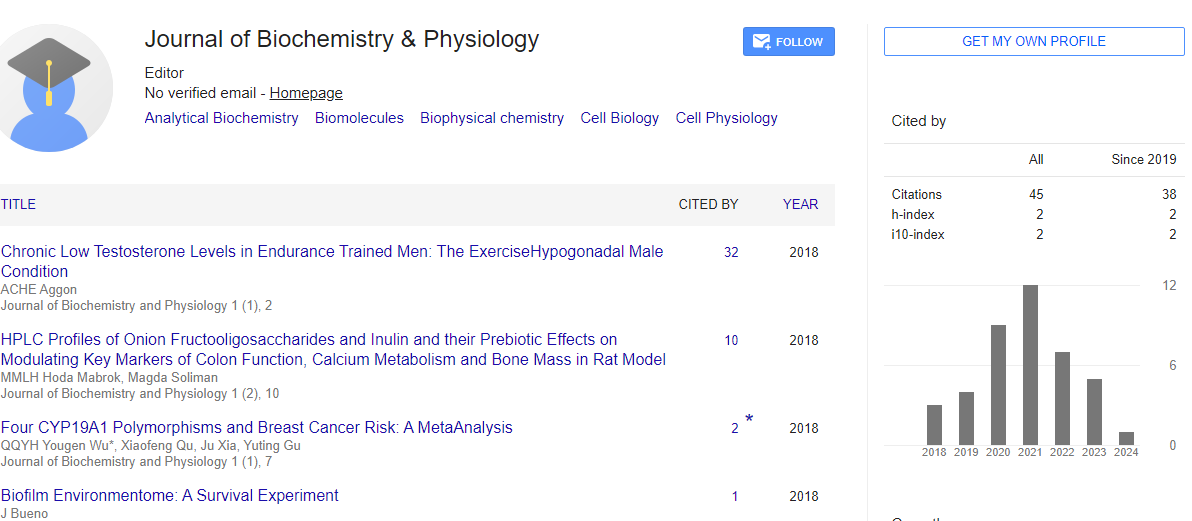Perspective, J Biochem Physiol Vol: 7 Issue: 4
Role of Human Blood Monocytes in Immune Response and Inflammation
Nyxian Delor*
1Department of Biochemistry, Moscow State University, Ulitsa Kolmogorova, Moscow, Russia
*Corresponding Author: Nyxian Delor,
Department of Biochemistry, Moscow State University, Ulitsa Kolmogorova, Moscow,
Russia
E-mail: delornyx@ed.axin
Received date: 23 November, 2024, Manuscript No. JBPY-24-154539;
Editor assigned date: 25 November, 2024, PreQC No. JBPY-24-154539 (PQ);
Reviewed date: 09 December, 2024, QC No JBPY-24-154539;
Revised date: 17 December, 2024, Manuscript No JBPY-24-154539 (R);
Published date: 24 December, 2024, DOI:10.4172/jbpy.1000179.
Citation: Delor N (2024) Role of Human Blood Monocytes in Immune Response and Inflammation. J Biochem Physiol 7:4.
Description
Human blood monocytes are a critical component of the immune system, playing an essential role in the body's defense against infections and the regulation of inflammation. As part of the innate immune system, monocytes are precursors to macrophages and dendritic cells, which are important for immune surveillance, antigen presentation and tissue repair. Understanding the role of monocytes in immune response and inflammation is important in explaining the pathogenesis of various diseases, ranging from infections to chronic inflammatory conditions.
The activation of monocytes occurs in response to various stimuli, including pathogens, cytokines and damaged tissues. Upon encountering these stimuli, monocytes undergo a process called chemotaxis, which directs them to the site of infection or injury. They respond to signals such as cytokines and chemokines, which are released by other immune cells or infected tissues. Monocytes have several important functions in the immune system. One of their primary roles is phagocytosis, the process by which they engulf and digest pathogens, dead cells and other debris. This action is important for limiting the spread of infections and preventing the accumulation of cellular waste. After phagocytosis, monocytes and their derivatives release cytokines that help coordinate the immune response, recruiting other immune cells, such as neutrophils and T cells, to the site of infection.
In addition to phagocytosis, monocytes are involved in antigen presentation. After ingesting pathogens, monocytes break them down into small fragments, which are then displayed on the cell surface using Major Histocompatibility Complex (MHC) molecules. These fragments, known as antigens, are recognized by T cells, which can then initiate a more specific adaptive immune response. This function bridges the innate and adaptive immune systems, ensuring a more coordinated and effective response to pathogens.
Monocytes also play a significant role in inflammation, both in its initiation and resolution. Upon activation, monocytes release a variety of pro-inflammatory cytokines, such as Tumor Necrosis Factor-alpha (TNF-α), Interleukin-1 (IL-1) and Interleukin-6 (IL-6), which promote the recruitment of additional immune cells and amplify the inflammatory response. These cytokines are essential for fighting infections and repairing damaged tissues. However, excessive or prolonged inflammation can lead to tissue damage and the development of chronic inflammatory diseases, such as atherosclerosis, rheumatoid arthritis and inflammatory bowel disease.
In chronic inflammation, monocytes contribute to tissue remodeling and the determination of inflammation. The continuous activation of monocytes and the production of pro-inflammatory cytokines can amplify the inflammatory response, leading to tissue damage and the development of autoimmune diseases. This phenomenon is observed in conditions like atherosclerosis, where activated monocytes infiltrate the walls of blood vessels, contributing to plaque formation and the progression of cardiovascular disease. Monocytes are also involved in the resolution of inflammation. Once the infection or injury has been controlled, the immune system needs to return to homeostasis. During this phase, monocytes help to clear apoptotic cells, which is essential for preventing further inflammation. Furthermore, anti-inflammatory cytokines, such as Interleukin-10 (IL-10), are released by monocytes to dampen the immune response and promote tissue repair.
Conclusion
Human blood monocytes are important mediators of both immune responses and inflammation. Their ability to differentiate into macrophages and dendritic cells, perform phagocytosis and release cytokines positions them as central players in the body's defense mechanisms. However, the dysregulation of monocyte function can contribute to the development of chronic inflammatory diseases and autoimmune disorders. Therefore, a deeper understanding of monocyte biology is essential for identifying therapeutic targets that can modulate their activity and provide new treatments for a wide range of inflammatory conditions.
 Spanish
Spanish  Chinese
Chinese  Russian
Russian  German
German  French
French  Japanese
Japanese  Portuguese
Portuguese  Hindi
Hindi 